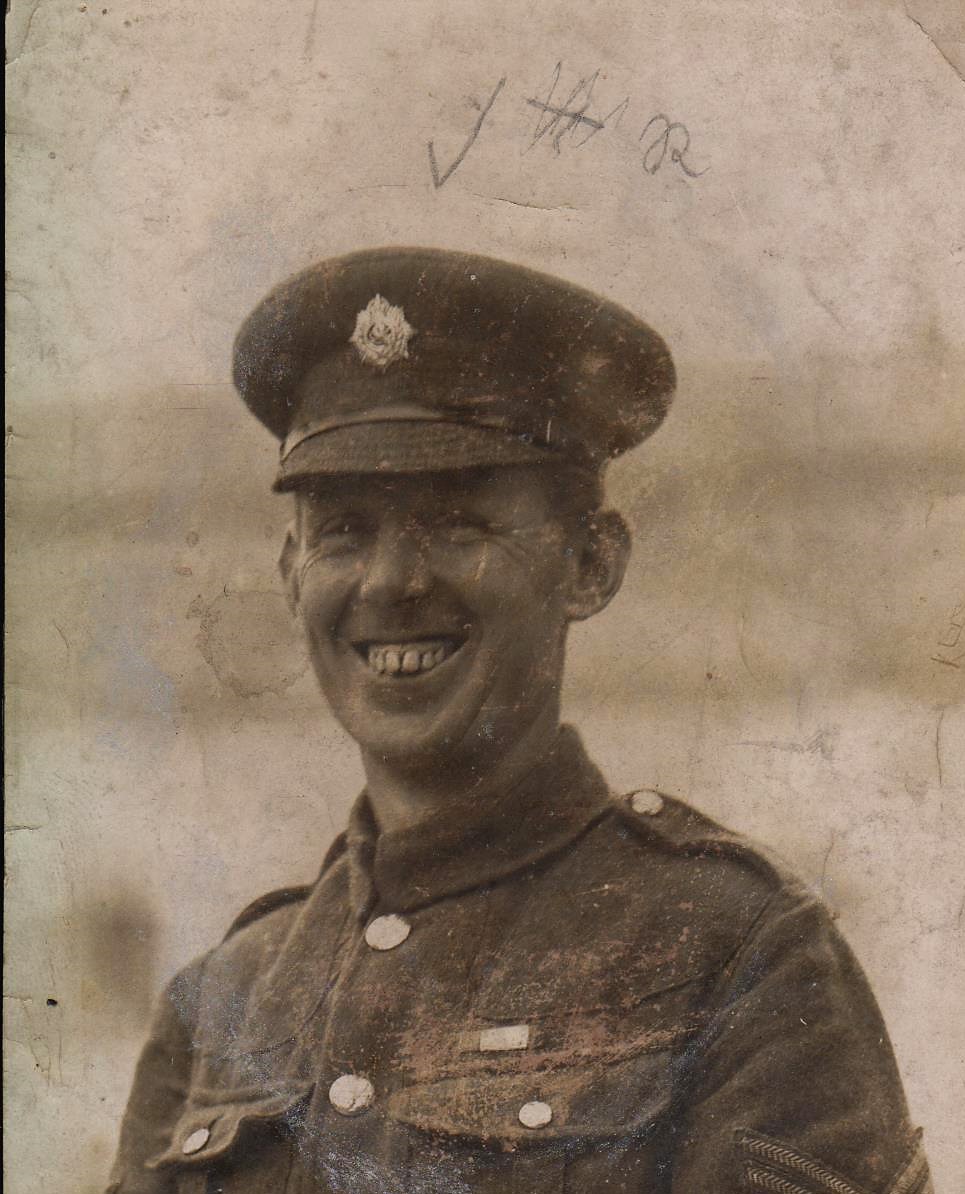
Gerald Burnett visited the museum to relate the story of his grandfather Ernest Wyatt Burnett.
My Grandfather, Ernest Wyatt Burnett was born in Chudleigh, Devonshire, in 1886. After minimal schooling and several agricultural jobs, Ernest moved to London and became a chauffeur with various employers including Thomas Tilling. He spent the pre-war years driving around Great Britain with American tourists and contemporary industrialists such as Tommy Lipton of tea fame.
Ernest enlisted with the Royal Army Service Corps, Mechanical Transport Branch, in April 1915 and became a Staff Car driver.
In 1915, the Government appointed five official Western Front War Correspondents, Philip Gibbs, Percival Phillips, H. Perry Robinson, W. Beach Thomas and Herbert Russell. Ernest was assigned to be their driver, a position he held until the end of the war.
Ernest was transferred to the Reserve in February 1919. Alongside his ‘Pip, Squeak and Wilfred’ decorations he was awarded a Silver Medal for Merit by Nicholas I, King of Montenegro.
During WW2, Ernest served with the Home Guard at Balcombe Place, his Sussex home, where he was chauffeur to Lady Gertrude Denman who was President of the Women’s Institute and Honorary Director of The Women’s Land Army.
My Grandfather was one of the lucky ones. He served his country, survived two World Wars, and lived a full and interesting life.




Explore more memories from the ribbon
-
Alfred W Salmon
Alfred was born around June 1882 at Thornaby near Stockton, the son of Thomas Salmon, a foreman brewer. Alfred would eventually become an assistant grocer at Leyburn. Here he courted Lizzie Chiltern. Lizzie’s brother James had joined the West Yorkshire Regiment and was killed in June 1917 aged 20. It would appear that they never married as Alfred’s attestation form, when he signed up, has him as unmarried. The 1911 census has Alfred living in Leyburn as a boarder to a widow Catherine Pearson, aged 70. He enlisted on the 8th April 1916 at Leyburn joining the 5th Battalion Yorkshire Regiment. By early 1917 Alfred had been wounded and was to spend the rest of 1917 and part of 1918 convalescing in England. He was discharged from the Army on the 15th April 1918, his rank being Lance Corporal. Alfred was now living in Waverley Terrace, Darlington. It was here that he died from pneumonia, exacerbated by his war wounds on the 16th February 1919 aged 36. Alfred was buried in Darlington West Cemetery.
-
Henry Jesse Richardson
Paul Goad of Frenchgate told us about his Great-Uncle, Henry Jesse Richardson. Henry was born in March 1889 in Hailsham, East Sussex, where he lived prior to enlistment. In the 1911 census he gave his profession as Mat Making, his Father William, being a Mat Weaver at that time. Hailsham had a vibrant string, twine and rope based industry at the time from which they gained their employment. Henry enlisted in 1916 at Purfleet and joined the 13th London Regiment (Princess Louise’s Kensington Battalion). Henry’s Service medal and Award Rolls show that he served on the Western Front from September 1st 1916 until his death on August 16th 1917 at the Battle of Langemarck. During his time in theatre Henry’s Battalion were in action at the Battles of Ginchy, Flers-Courcelette and Morval in 1916 and the Second Battle of Arras in 1917. Henry’s burial spot is at Ypres, Arrondissement Ieper, West Flanders Belgium. He is also remembered on the roll of Hailsham War Memorial.
-
Cyril and Christopher Fawcett
Paul Goad, a resident of Frenchgate and local history enthusiast submitted his research on one of the families from Frenchgate at the time of the Great War. The Fawcett family lived at 55 Frenchgate, Richmond throughout the First World Ward. John Fawcett, who worked in agriculture and construction, lived here with his wife Elizabeth Grace, daughter Elizabeth Alice and two sons, Christopher and Cyril Edgar. John was born in Castle Bolton in Wensleydale, Elizabeth Grace in Thornton Buckinghamshire and all three children hailed from the small parish of Walburn, Downholme a little way up Swaledale from Richmond. At the outbreak of hostilities Christopher was 20 and Cyril 14. As the eldest, Christopher was the first to enlist on 27th November 2015, three months shy of his 22nd birthday. Prior to enlistment he worked as a butcher, a profession he continued after the war. In January 1916 he joined the 4th Battalion of the Durham Light Infantry. The 4th DLI were a reserve Battalion and were station at Seaham Harbour from 1915 through to the end of the War. Records confirm that Christopher was based at Seaham from 1916 to June 1918 serving in D Company. A copy of a charge sheet shows that Christopher was late returning from leave on June 12th 1916 for which he was forfeited 1 days pay. In October 1917 Cyril enlisted at the age of 18 years and 1 month, giving his trade as a Motor Driver. Despite his Attestation papers suggesting that he was…
